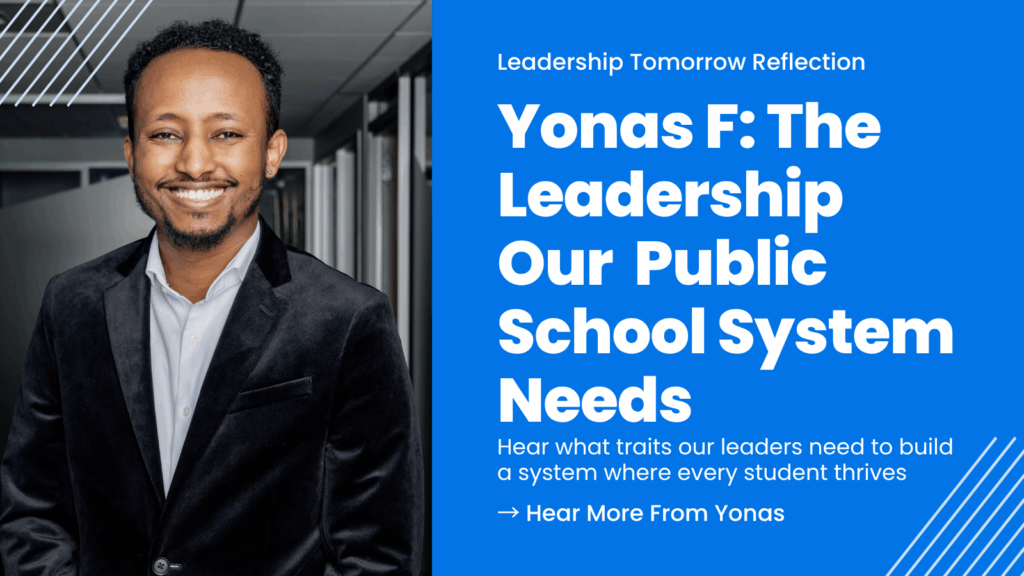Bold, community-rooted, visionary, equity-centered and emotionally-intelligent are just a few words to describe the leaders we need to build a public school system where every student thrives.

During Leadership Tomorrow’s Possibility Day, someone posed a powerful question: Why is the program called Leadership Tomorrow when what we urgently need is leadership today?
At first glance, the critique feels spot on. But upon reflection, it becomes clear: while we are already leaders, we must prepare today for the leadership challenges of tomorrow. Imagine the kind of leadership we’ll need once we emerge from our current crises—assuming we do.
During the Possibility Day, we were asked: What will it take to create an education system where every student can thrive? We examined the many racial disparities embedded in our system—gaps in access, inequities in state funding, differences in student proficiency, quality of instruction, and more. You likely know this story by now, so I won’t rehash it here. But let’s be clear: with today’s leadership, not every student is thriving.
Thriving looks different across communities, so we must ask students what thriving means for them. When I imagine a thriving student, I see someone who wakes up to a nourishing meal, looks forward to school, arrives with ease and optimism, engages in meaningful follow-up conversations from the previous day’s lessons, and grows more confident in both their academic and social-emotional skills.
So, what kind of leadership will it take to realize that vision? Here’s what I believe we need:
Bold Leadership
In the face of unraveling systems, we must GO BIG or GO HOME. If federal structures like the Department of Education are dismantled, we will need even bolder leadership to respond and repair. Bold leadership will fight to ensure civil rights are protected and that public education receives the funding it needs. It will prioritize funding based on students’ needs—not seat counts. It will ensure the most qualified educators are placed where they’re needed most and are fully supported to do their best work.
Community-Rooted, Visionary Leadership
We need leaders who ground their vision in the communities they serve—not in personal ambition. When they share this vision, it should resonate so clearly that the community can feel it, imagine it, and believe in the path forward. We don’t need charisma that sells dreams with no roadmap. We need inspiration grounded in achievable, shared goals.
“All of the Above” Leadership
Educational environments are full of competing demands that strain relationships and reduce effectiveness. We need leadership that can creatively navigate these tensions—leadership that sees a way to meet the needs of teachers, staff, and students alike. When teachers are given time to plan or space to prioritize their well-being, students benefit through more thoughtful, culturally relevant, and rigorous learning experiences.
Equity-Centered Leadership
Inequity is woven into the fabric of our educational systems—products of decades of systemic racism and exclusion. We need leaders who are not afraid to confront these inequities head-on, who embed equity into every policy and practice. These leaders must be constantly refining their equity lens and have the courage to speak truth to power when necessary.
Emotionally Intelligent Leadership
Leaders must have the emotional intelligence to hold courageous conversations. These are the moments when our understanding is shaken, but we emerge more grounded and clearer about the changes required. Emotionally intelligent leaders understand the power of emotions and never dismiss them. If we want students to thrive, we must create environments where they feel good about themselves and their surroundings. This kind of leadership sees emotions not as obstacles, but as essential to growth and connection.
Asking, “What will it take to create an education system where every student can thrive?” compels us to envision a more human-centered experience—where academic excellence is not pursued in isolation but interwoven with emotional and community well-being. If we are truly serious about designing and implementing an education system that puts students at the center, then we must surround them with well-trained, emotionally and physically healthy adults who lead with vision, courage, and care.
This blog post was originally published by Leadership Tomorrow as part of their 10-month flagship program as a Possibility Day Reflection featuring class member insights and related materials on the topic of education. Yonas Fikak is part of the LT’25 class.
